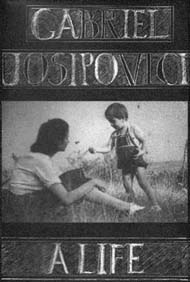
Memoir, Mourning and Biography
The shape of a life
Josipovici told the audience that while felt compelled to write about her, he didn't want to write a traditional biography, even if there was plenty in Sacha's life to merit one. Nor did he want solely to write a memoir written from the angle of the grieving son, though that was clearly part of the compulsion. What he wanted to do, and what excited him even as he grieved, was to capture the shape of her life. It would be like the arc of a meteorite, he said, or, less grandly, the trace of a worm's progress through the earth.
The challenge to make this shape plain provided a much-needed balance to the distress and confusion he was otherwise experiencing. And, as he began to work, he said he came to realise that the distress and confusion was due in part to losing his own life. Sacha had taken his life too. As she was its principal witness, he had lost his past. So perhaps writing would return him to his life as he reconstructed hers.
Josipovici regretted that the shape of the subject's life is missing from most, if not all prominent biographies. He mentioned the recent two-volume WB Yeats biography by Roy Foster . While impressive in its supply of detail and analysis, he said it lacked the shape that the poet himself was aware of toward the end of his life. What he was after in A Life was something like the quality of compression in the works by writers like Yeats, Homer and Dante. Rather than accumulating fact upon fact like a dogged researcher, there is a lightness. A whole life is contained in a few lines of verse. Instead of repeating famous instances (such as Paolo and Francesca), he quoted - with suitably gruff Gaelic accent - from the traditional ballad of northern Britain, Sir Patrick Spens , in which sailors drown in a storm.
O our Scots nobles wer richt laith
To weet their cork-heild schoone;
Bot lang owre a' the play wer playd,
Their hats they swam aboone .
Rather than speculating on the sailors' thoughts as they died – as most traditional novels or biographies might – the verse merely describes their hats on the sea's surface. Curiously, while there is pathos in this image, it also lacks sentimentality. This is the opposition, or perhaps the internal contradiction, at the heart of Josipovici's project. How could he write a such a long book and retain this quality?
An admission of a problem inherent in the project came when he said that each novel, story or play he had ever written had a clearly defined border, while this book didn't. He didn't know what to put in and what to leave out. One can appreciate this reading the book: it could have been a lot shorter and it could have been a lot longer. If Josipovici had played to form, it would have been a lot shorter: not one of his novels reaches 250 pages, let alone the 294 of A Life . He might have taken as a guide Borges' beautiful, profound and very short prologues in A Personal Library (collected in A Total Library ) that describe the arc of a life by concentrating on certain events. After all, it was Borges' suggestion that perhaps Everyone is defined forever in a single instant of their lives, a moment in which a man encounters his self for always .
However, this way, the detail of a life is lost. In mitigation, one could cite Proust's In Search of Lost Time , as an example of how defining instants in a life can be given the sharpest relief within a more discursive narrative. In A Life , the defining moment (according to Josipovici) is the story his mother told him when he was old enough to appreciate it.
In 1943, Sacha took her three-year-old son on a train journey from Nice to the Massif Central. They were escaping Nazi round-ups of local Jews. The journey took two days. The train could be have been stopped at any moment and the passengers searched. Sacha placed little Gabriel in another carriage with another, non-Jewish family as she felt that, if questioned, she could not deny her origins, even though she had always been a non-practicing, secular Jew. But at least her child would escape.
This extraordinary act – was it courage? was it suicidal willfulness? – seemed central. I can't remember Josipovici's justification for this, so I re-read the end of the book. I had forgotten what was written there. It is easy to miss, as the final chapters are so harrowing that one reads the final pages in a daze.
My understanding is that Sacha's instinct was to remain herself in spite of all the world threw at her. This could lead to dangerously self-destructive thoughts, to light yet bitterly wrought poems , and also to long term survival against the odds. Such an instinct – which Josipovici sees as particularly Jewish – is in part destiny (Josipovici used that word): a life is the process of becoming oneself. It was for this reason he felt it necessary to devote at least half of the book to her 40 years in peaceful England despite the original publisher insisting that he concentrate on the tragedies of the early years. The shape of the life could not be altered to fit market demands. He changed publisher instead.
Yet perhaps the story of Sacha's life could have been told with more
concision and discretion. One feels Sacha herself would be horrified
by some passages in the book. In fact, her son admitted as much, but
he also feels that they are necessary to show how Sacha Rabinovitch
became herself, and, as she told him on her deathbed, achieved a kind
of happiness.
July 10, 2004